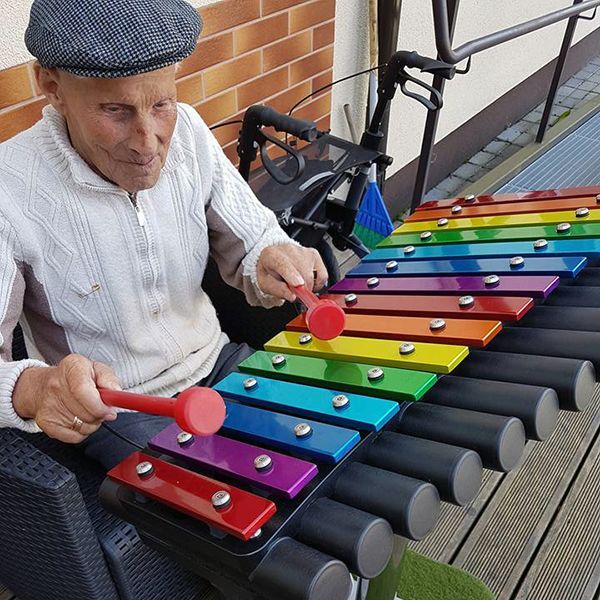
Let's Jam
Simply enter your name, email address, and click subscribe to get the latest product updates.
By clicking "Subscribe", you confirm that you have read and accepted our Terms and Conditions, Privacy Policy and Cookie Policy.
On World Music Therapy Day, March 1, we highlight how music and music therapy have the power to heal, improve mental health and wellbeing and enrich lives.
Music has long been used to help heal, transcending nations and cultures; this is why music is often referred to as the universal language. Music therapy benefits cognitive, emotional, and social issues and the physical needs of people. It has proven to be an effective way to help alleviate symptoms and provide a sense of inner calm to patients. For this reason, music therapy is becoming an increasingly popular form of holistic 'healing' and is used in hospices, care homes, residential homes, schools, and rehabilitation centers worldwide.
Treatment using music can help those experiencing loneliness, mental ill-health, and degenerative conditions such as dementia by enabling them to 'reconnect' with the world around them and encouraging them to communicate with others in a non-verbal way. Playing musical instruments and engaging in music therapy have been proven to significantly improve communication for those living with a wide range of disabilities and health conditions.
According to The America American Music Therapy Association (AMTA), there are over 8,000 registered Music Therapists in America. To qualify, therapists must have received a bachelor's degree in music to pursue a master's degree in Music Therapy, which is offered by 30 AMTA-approved degree programs.
Music Therapy can be beneficial for those diagnosed on the autistic spectrum. Autism is defined by a specific set of behaviors and is a 'spectrum disorder,' which affects individuals differently and to varying degrees. Autism affects the development of the individual's social, verbal, and cognitive abilities so that someone with autism may find it challenging to communicate with others. Involvement in music-making can both stimulate and relax a person leading to very positive changes. Outdoor musical instruments, such as Percussion Play's 'Duo,' are particularly beneficial for individuals with autism because the instrument allows for close social interaction without forcing close physical proximity. The players can interact with each other in a safe space without making direct eye contact.
Music can help people begin to heal from Post-Traumatic Stress Disorder (PTSD). This psychiatric condition can occur in people with personal experiences of severe trauma, either first or second hand. PTSD often develops immediately following the traumatic event/s, but some sufferers (around one in five) experience symptoms with delayed-onset, often not surfacing for years after the event/s. Musical therapies have stood out throughout many studies due to the success rate compared to traditional and mainstream talking therapies. Music therapy was devised initially as a trauma response to aid the treatment of World War II veterans.
As well as helping with autism and PTSD, more generally, music helps promote physical movement, socializing, and expressing feelings, all of which are important to everyone. Our instruments are designed to bring people together to create uplifting music, which we think is the best form of therapy.
Click here to read about how the Western Pennsylvania School for Blind Children in Pittsburgh uses outdoor musical instruments for musical therapy with its patients.
Read our White Paper Music as Medicine: Combating PTSD With Music and Music Therapy